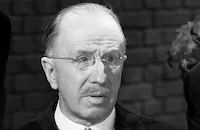M'liss

Brief Synopsis
Cast & Crew
George Nicholls Jr.
Anne Shirley
John Beal
Guy Kibbee
Douglass Dumbrille
Moroni Olsen
Film Details
Technical Specs

Synopsis
Melissa "M'liss" Smith, the teenaged daughter of Washoe Smith, an alcoholic has-been gold miner, expresses her outrage when the town, which is named Smith's Pocket after her father's only claim, forces them out of their home and converts the building into a school. When he learns of her plight, Stephen Thorne, the new teacher, insists that M'liss go to school and encourages her to learn in spite of her poverty. M'liss performs well in class, but her job washing dishes in the local saloon distresses Stephen deeply. Afraid of embarrassing his daughter in front of Stephen, who has requested a meeting with him, the drunken Washoe slips away and heads for the saloon, where he is fatally wounded in an argument. Now under the guardianship of gambler Lou Ellis and barber Alf Edwards, M'liss attracts the attention of Jack Farlan, a city cousin of the wife of the mayor, James Morpher, whose snobbish daughter Clytie is M'liss' hated rival. After M'liss rejects Jack's overtures, Jack tells the Morphers that he knew Stephen in Nevada when he was a newspaper editor and that Stephen was driven out for refusing to fight a duel. Gossip spreads and M'liss soon finds herself hotly defending Stephen's bravery to Clytie, which causes Mayor Morpher to threaten to send M'liss to an orphanage. Risking his own position, Stephen cajoles the Morphers into giving M'liss another chance, but then must convince M'liss not to run away by kissing her. Confused but assured by Alf and Lou that Stephen wants to marry her, M'liss consults with Rose, a saloon girl, about the realities of marriage. Her entrance into the saloon is noted by Clytie and by a drunk Jack, who tries to force himself on her. Stephen arrives in time to prevent Jack's assault, but seeing his foe drunk, declines to fight him. Afterward, Stephen shows M'liss his marksmanship medals and explains that he never fights with a lesser opponent. That night, Jack is shot outside of M'liss' cabin, and although Lou is guilty, Stephen is suspected. In spite of M'liss' protests, Mayor Morpher and Judge Weinner accuse Stephen of cowardly murder, and Stephen's future looks short and bleak until news of Jack's recovery arrives. Cleared of all charges and returned to good standing, Stephen proposes to M'liss.

Director
George Nicholls Jr.
Cast

Anne Shirley

John Beal

Guy Kibbee

Douglass Dumbrille

Moroni Olsen
Frank M. Thomas
Ray Mayer

Barbara Pepper

William Benedict

Arthur Hoyt
Margaret Armstrong
James Bush
Esther Howard
Louis Mason
Arthur Loft

Fern Emmett
Crew
Samuel J. Briskin
Alberto Colombo
George D. Ellis
Perry Ferguson
Robert De Grasse
Kenny Holmes
Elizabeth Mcgaffey
William Morgan
Van Nest Polglase
Robert Sisk
Dorothy Yost

Film Details
Technical Specs

Articles
M'liss -
By Violet LeVoit

M'liss -
Quotes
Trivia
Notes
Bret Harte's name appears above the onscreen title. Harte's novelette, which appeared first as a serial in the San Francisco publication Golden Era in 1863, was expanded from an 1860 short story of the same name. M'liss was the last of five collaborations between Anne Shirley and director George Nicholls, Jr. Contemporary reviews noted that the Wild West flavor of Harte's novelette was changed to a small-town flavor in this version. RKO borrowed Guy Kibbee from Warner Bros. and Douglass Dumbrille from Columbia for the production. The first film version of Harte's story was directed in 1915 by O. A. C. Lund for World Film Corp. and starred Barbara Tennant, and the second was directed by Marshall Neilan in 1918 for Mary Pickford's film company (see AFI Catalog of Feature Films, 1911-20; F1.3010 and F1.3011). According to modern sources, researcher Elizabeth McGaffey worked on both the 1936 production and the Pickford version of the story. In 1922, Rupert Julian directed Gladys Walton in a Universal version of Harte's story, titled The Girl Who Ran Wild (see AFI Catalog of Feature Films; F2.2109). In 1952, the NBC network broadcast a television version of M'Liss.














